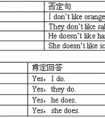Findoutthemistakesandcorrectthem. 找出错误并改正。( ) 1.Didyourememberplaygamesyesterday ? A B C( ) 2.Manypeoplesareinthestore. A B C( ) 3.Howareyoumakecoo-六年级英语
(4)by 被……,在……的近旁,在……之前,不迟于,以……为手段。
The class room was cleaned by the students. 教室由学生们打扫干净了。
Miss Lucy came to China by air. 露西小姐是乘飞机来中国的。
(5)for为……,因为……,至于……。
He works for this company. 他为这家公司工作。
She came back to the classroom for she had lef the books in the class room. 她返回到教室是因为把书留在了那里。
(6)from从……,来自……,因为……
Where are you from? 你是哪里人?
He diedf rom an accident. 他死于一场事故。
(7)of……的,属于……
This is a map of China.这是一张中国地图。
(8)with使用、和……在一起
We write with a pen. 我们用笔写字。
Can you go to the park with me? 你能和我一起去公园吗?
注意:在last, next, this, that, some, every 等词之前一律不用介词。如:We meet every day.
小学常见介词:
1.on
(1) 在------上面 The book is on the desk.
(2) 在------(哪一天/星期)What do you do on Wednesday?
(3) 在------(月、日)My birthday is on August 2nd.
2. in
(1)在------里面 The pens are in the pencil-box.
(2)在------(哪一年/月)His birthday is in October.
He worked here in 1992.
(3 ) 在------(地方) He works in Dongguan.
(4 ) 在------之内 What are you going to do in 20 years?
(5 ) 在------(早上、下午、晚上)
I do morning exercises in the morning every day.
I usually play basketball in the afternoon.
I often do my homework in the evening.
3. under
在------底下 There is a ball under the bed.
4. near
在------附近 There is a book shop near our school.
5. in front of
在------前面 A boy is standing in front of the house.
6. beside
在------旁边 A football is beside the door.
7. next to
紧挨着 There is a bus station next to No. 13 Middle School.
8. over
在------正上方 A bridge is over the river.
9. on the left
在------左边 The bookstore is on the left.
10. on the right
在------右边 The hospital is on the right.
11. before
在……之前 Mike sits before me.
12. after
在------以后 He went home after school.
13. in the middle
在------中间 The road is in the middle.
14. at
(1) 在------(小地方) I am at school today. I was at home yesterday.
(2) 在------(点钟) I usually go to school at 8:00 am.
(3)看一看 Look at the blackboard.
(4) 在中午 at noon
15. behind
在------后面 There is a broom behind the door.
16.for
(1)给 This present is for you.
(2)为了 Thank you for telling me the way to the zoo.
(3)作为 We have some chips and hamburgers for lunch.
17.to
(1) 到 Take your sport shoes to the P.E class.
(2) 致 Happy birthday to you. Give it to your friend.
18. from
来自 I am from China. = I come from China.
19. from --- to
从------到------ Line up from shorter to taller.
We have class from Monday to Friday.
20. of
------的 He is a student of Kama School.
21. by
(1)在------之前 We must be at home by 6 o’clock.
(2)乘------交通工具 People can go to the moon by spaceship.
I go to school by bus.
22.with
(1) 用 I write a letter with a pen.
(2) 和------一起 He went to Shenzhen with his parents.
23. between
在------与------之间 There is a football match between Class One and Class Three.
24. into
到------里 Sharks can dive into the deep cold water.
25. like
(1)象------ The twins are like their father.
(2)长相------怎样? What’s he like?
26. up
向上 Put up your hands if you have any questions.
27. down
向下 Put down all the books here.
28. about
(1) 大约;关于 It’s about 6:00 now.
(2) ------怎么样? What about---? How about---?
29. what for
为什么 But what for?
早、午、晚要用in,at黎明、午夜、点与分。
年、月、年月、季节、周,阳光、灯、影、衣、冒in。
将来时态in...以后,小处at大处in。
有形with无形by,语言、单位、材料in。
特征、方面与方式,心情成语惯用in。
介词at和to表方向,攻击、位置、恶、善分。
日子、日期、年月日,星期加上早、午、晚,
收音、农场、值日on,关于、基础、靠、著论。
着、罢、出售、偷、公、假,故意、支付、相反,准。
特定时日和"一……就",on后常接动名词。
年、月、日加早、午、晚,of之前on代in。
步行、驴、马、玩笑on,cab,carriage则用in。
at山脚、门口、在当前,速、温、日落、价、核心。
工具、和、同随with,具有、独立、就、原因。
就……来说宾译主,对、有、方状、表细分。
海、陆、空、车、偶、被by,单数、人类know to man。
this、that、tomorrow,yesterday,next、last、one。
接年、月、季、星期、周,介词省略已习惯。
over、under正上下,above、below则不然,
若与数量词连用,混合使用亦无关。
beyond超出、无、不能,against靠着,对与反。
besides,except分内外,among之内along沿。
同类比较except,加for异类记心间。
原状because of,、 owing to、 due to表语形容词
under后接修、建中,of、from物、化分。
before、after表一点, ago、later表一段。
before能接完成时,ago过去极有限。
since以来during间,since时态多变换。
与之相比beside,除了last but one。
复不定for、找、价、原,对、给、段、去、为、作、赞。
快到、对、向towards,工、学、军、城、北、上、南。
but for否定用虚拟,复合介词待后言。
ing型由于鉴,除了除外与包合。
之后、关于、在......方面,有关介词须记全。
in内to外表位置,山、水、国界to在前。
考点名称:一般现在时,动词单数第三人称
一般现在时:
表示现在经常反复发生的动作、存在的状态或习惯性的动作的时态。可概括为
①经常性或习惯性动作;
②长期存在的特征或状态;
③普遍真理、客观事实等。
构成:
一般现在时用行为动词的原形,但第三人称单数作主语时,动词的词尾要加-S。
a. 表示经常性或习惯性的动作。
例:Li Ming always helps the old man. 李明一直帮助这位老人。
We usually go to school on foot. 我们通常步行上学。
They sometimes go fishing on Sundays. 他们有时周日去钓鱼。
b. 表示永恒不变的事实或真理。
例:A bird flies with wings. 鸟用翅膀飞翔。
c. 用在格言、谚语中。
例:Pride goes before a fall. 骄者必败。- 一般现在时具体用法:
1.表示经常的或习惯性的动作,常与表示频率的时间状语连用。
时间状语:
always,usually,every morning/night/evening/day/week/year,often,sometimes,
occasionally,from time to time,twice a week,rarely,seldom,once a month,hardly,ever,never.
e.g: I leave home for school at 7:00 every morning.
2.表示主语具备的性格、能力、特征和状态。
e.g:I don't want so much.
Ann Wang writes good English but does not speak well.
比较:Now I put the sugar in the cup.
I am doing my homework now.
3.表示客观事实和普遍真理。
e.g :The earth moves around the sun.
Shanghai lives in the east of China.
4.在时间状语从句和条件状语从句中,常用一般现在时代替将来时。
5.表示预先计划或安排好的行为。
6.小说故事用一般现在时代替一般过去时。新闻报道类的内容,为了体现其“新鲜”性,也用一般现在时来表示过去发生的事情。
- 最新内容
- 相关内容
- 网友推荐
- 图文推荐
| [家长教育] 孩子为什么会和父母感情疏离? (2019-07-14) |
| [教师分享] 给远方姐姐的一封信 (2018-11-07) |
| [教师分享] 伸缩门 (2018-11-07) |
| [教师分享] 回家乡 (2018-11-07) |
| [教师分享] 是风味也是人间 (2018-11-07) |
| [教师分享] 一句格言的启示 (2018-11-07) |
| [教师分享] 无规矩不成方圆 (2018-11-07) |
| [教师分享] 第十届全国教育名家论坛有感(二) (2018-11-07) |
| [教师分享] 贪玩的小狗 (2018-11-07) |
| [教师分享] 未命名文章 (2018-11-07) |

![Does she like ____on weekends? [ ]A. going shoppingB. go shoppingC. go shop-六年级英语](http://www.00-edu.com/d/file/ks/4/1/55/2019-08-27/smalle6a92ee9e61a2aa039771cc65dedb40c1566919813.jpg)

![_____ is exercise.[ ]A. SwimmingB. SwamC. Swiming-六年级英语](http://www.00-edu.com/d/file/ks/4/1/55/2019-08-27/small40973c49a53101aac60eff6217bb35b51566919892.png)
![Myfavouriteschoolworkisbooks.[ ]A.readsB.readingC.read-四年级英语](http://www.00-edu.com/d/file/ks/4/1/55/2019-08-27/small8a67cf251e3192e64cc06a4ac60a96381566918811.png)
![The girl is very good at _____________. [ ]A. readB. readsC. writerD. writing-五年级英语](http://www.00-edu.com/d/file/ks/4/1/55/2019-08-27/smalla9ccf813980fe587df504d29b874bb8c1566919421.png)
